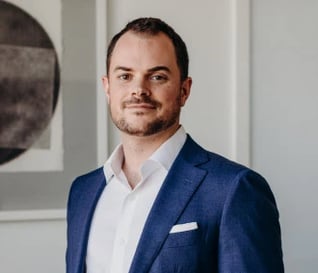7 min read
Finding the Right Healthcare Fraud and Abuse Lawyer for Your Case
![]() Maximillian J. Muller, Esquire
Feb 6, 2025 8:21:00 AM
Maximillian J. Muller, Esquire
Feb 6, 2025 8:21:00 AM
Within the healthcare industry, accusations of healthcare fraud or abuse can lead to serious consequences.
These cases often involve alleged fraud tied to Medicaid services, Medicare programs, or other government healthcare programs. Whether you're a healthcare provider facing a federal healthcare fraud investigation or an employee in the healthcare services sector concerned about false claims, dealing with these serious accusations requires a skilled and experienced attorney.
Federal laws, like the False Claims Act and the Anti-Kickback Statute, impose strict regulations on healthcare companies and providers. Even minor errors in billing or coding can lead to significant penalties if prosecutors interpret them as an intent to commit healthcare fraud. Beyond civil monetary penalties, violations can result in severe criminal penalties, including federal prison time.
Given the high stakes, it’s important to partner with a healthcare fraud lawyer who understands the complexities of abuse laws, patient records, and federal regulations. An experienced attorney can provide guidance through the legal process, protect your rights, and help minimize risks to your career, reputation, and financial future.
Understanding Healthcare Fraud and Abuse
What is Healthcare Fraud?
Healthcare fraud occurs when individuals or entities intentionally defraud a health care benefit program, such as Medicare, Medicaid, or private insurance companies. It’s important to note that not every billing error or coding mistake constitutes fraud. Intent is the necessary factor in health care fraud investigations, and proving intent is often at the center of these cases.
Healthcare fraud can take many forms, including:
- Billing for services not rendered: Charging for medical services or procedures that were never performed.
- Upcoding: Submitting claims for more expensive procedures than those actually performed.
- Inflating cost reports: Overstating expenses or costs to maximize financial gain.
These actions not only affect government healthcare programs like Medicaid but also place significant strain on the healthcare industry as a whole, including healthcare providers who may become unwitting victims of fraudulent schemes.
Why Does It Matter?
Healthcare fraud cases carry serious penalties, ranging from civil monetary penalties to federal criminal charges. For healthcare providers and companies, being accused of committing healthcare fraud can result in loss of licensure, reputation damage, and even federal prison time. Federal prosecutors work closely with agencies like the Office of Inspector General to enforce abuse laws and investigate allegations thoroughly.
Contact Us Now
What Are the Federal Healthcare Fraud Laws?
What Is Federal Healthcare Fraud (18 U.S.C. 1347)?
Federal healthcare fraud is a serious offense outlined in 18 U.S.C. § 1347, which makes it illegal to defraud a health care benefit program or fraudulently obtain money through false claims. The main element in these cases is intent, prosecutors must prove that an individual knowingly acted to commit healthcare fraud.
Common examples of violations include:
- Submitting false claims for medical services.
- Misrepresenting facts to obtain money from government healthcare programs.
- Using false promises or documentation to collect payments for healthcare services.
The consequences of violating this law are severe, with penalties including up to 10 years in federal prison, substantial fines, or both.
What Is the Anti-Kickback Statute (42 U.S.C. 1320a-7b)?
The Anti-Kickback Statute prevents improper financial incentives in the healthcare industry. It prohibits individuals or entities from offering, soliciting, or accepting payments or rewards (often called “kickbacks”) in exchange for patient referrals or services covered by government healthcare programs.
Examples of illegal kickbacks include:
- Referral fees or bonuses for directing patients to specific providers.
- Gifts, travel, or entertainment provided as incentives for patient referrals.
Violations of the Anti-Kickback Statute can result in fines, criminal charges, and civil penalties. This law is intended to protect patients and ensure that healthcare decisions are based on medical need, not financial gain.
What Is the False Claims Act (31 U.S.C. 3729 et seq.)?
The False Claims Act (FCA) makes it illegal to knowingly submit false claims to the federal government or use false records to secure payments. This law is one of the most powerful tools in combating healthcare fraud, as it holds individuals and entities accountable for defrauding government healthcare programs.
Key points about the False Claims Act:
- It applies to both federal and state healthcare fraud cases.
- Violators can face significant fines, civil penalties, and criminal prosecution.
- Whistleblowers who report false claims may receive financial rewards through “qui tam” lawsuits.
What Qualities Should You Look for in a Healthcare Fraud Lawyer?
Why Is Experience in Healthcare Law Important?
Healthcare fraud cases are complex, requiring a deep understanding of federal laws like the False Claims Act, Anti-Kickback Statute, and Stark Law. A qualified healthcare fraud attorney must have extensive experience handling these laws and defending clients in healthcare fraud investigations.
Questions to ask a potential lawyer:
- Have you represented healthcare providers or companies in healthcare fraud cases?
- How familiar are you with government healthcare programs, such as Medicare and Medicaid?
- Can you provide examples of successful cases involving healthcare fraud?
A skilled attorney can provide a complete regulatory analysis and craft a strong defense tailored to the specifics of your case.
Why Is Government Experience Valuable?
Healthcare fraud investigations often involve agencies like the Office of Inspector General, Department of Health and Human Services, and federal prosecutors. Attorneys with prior experience working with government officials or federal agents have an advantage, they understand how these investigations are conducted and can anticipate the prosecution’s strategies.
A lawyer with government experience is better equipped to:
- Negotiate plea deals or settlements.
- Navigate the enforcement efforts of federal healthcare fraud laws.
- Advise clients on compliance with healthcare regulations.
How Important Is a Lawyer’s Track Record?
A healthcare fraud attorney’s proven track record is one of the best indicators of their ability to handle your case. Look for attorneys who have successfully defended clients in federal healthcare fraud cases or negotiated reduced penalties for alleged fraud.
Factors to consider:
- The number of healthcare fraud cases they’ve handled.
- Specific examples of settlements or dismissed charges.
- Positive client reviews and references.
Choosing a lawyer with a history of success guarantees that you’ll be working with someone who knows how to manage the high stakes of healthcare fraud cases effectively.
Get Help Today
How Do You Choose the Right Healthcare Fraud Lawyer?
How Can You Evaluate a Lawyer’s Experience?
Not all lawyers can handle the complexities of healthcare fraud cases. When selecting an attorney, it’s crucial to assess their expertise in healthcare law and familiarity with the legal process surrounding fraud investigations.
Questions to consider:
- Has the lawyer worked on cases involving Medicare fraud, Medicaid abuse, or false claims?
- Do they understand the nuances of healthcare services and government healthcare programs?
- Can they handle both civil and criminal investigations?
How Important Is Communication and Availability?
Facing allegations of healthcare fraud can feel overwhelming, which makes communication with your lawyer of utmost importance. A good healthcare fraud lawyer will:
- Respond promptly to questions or concerns.
- Explain complex legal terms, like civil monetary penalties or federal criminal offenses, in a way that’s easy to understand.
- Keep you informed about each step of your case.
What Should You Know About Fees and Costs?
Legal fees can vary widely, especially for cases involving healthcare fraud. Transparency about costs is critical. Before hiring a lawyer, ask about:
- Their fee structure - do they charge hourly or a flat rate?
- Any additional costs, like fees for expert witnesses or internal investigations.
- Whether their pricing reflects their expertise and track record.
While cost is an important factor, it’s equally important to invest in an attorney who can handle the challenges of healthcare fraud cases effectively.
What Is the Process of Working with a Healthcare Fraud Lawyer?
What Happens During the Investigation Phase?
The first step in handling healthcare fraud cases is a thorough investigation. Your attorney will:
- Analyze patient records, billing documents, and financial reports for evidence.
- Conduct internal investigations to understand the scope of the alleged fraud.
- Identify weaknesses in the government’s case and build a strategy to protect your rights.
This phase is important, as it sets the foundation for your defense and may reveal facts to counter claims of false claims, phantom billing, or illegal kickbacks.
Will Your Lawyer Negotiate a Plea Deal?
If federal prosecutors bring charges, your attorney will aim to negotiate a resolution before trial. This can involve:
- Reviewing the evidence presented by government officials.
- Working toward reduced penalties, such as avoiding federal prison or minimizing civil penalties.
- Discussing settlement terms that align with your long-term goals.
While some cases require a trial, an experienced attorney will exhaust every option to secure the best outcome through negotiation.
What Happens if Your Case Goes to Trial?
When a plea deal isn’t possible, your case may proceed to trial. A health care fraud lawyer will:
- Prepare a strong defense against charges of Medicare fraud, Medicaid abuse, or other federal crimes.
- Present evidence, challenge the prosecution’s claims, and cross-examine federal agents or witnesses.
- Advocate for your rights to guarantee you receive a fair trial.
Why Choose Muller Brazil for Your Healthcare Fraud Case?
What Makes Our Approach Different?
At Muller Brazil, we know that facing allegations of healthcare fraud is stressful. That’s why we offer a personalized, hands-on approach to every case. When you work with us, you won’t be passed off to a paralegal or left wondering who’s handling your case - you’ll speak directly with one of our attorneys from day one.
We believe that your case is more than just a legal matter; it’s about protecting your career, reputation, and future. Our team takes the time to understand your story, the details of your case, and your goals. From investigating the allegations to defending your rights in court, we’re here to guide you every step of the way.
What Can You Expect When You Work With Us?
Our process is designed to make your experience as seamless and supportive as possible. Here’s what working with Muller Brazil looks like:
- Consultation: From the first consultation, you’ll meet directly with an experienced healthcare fraud lawyer. We take the time to review your case thoroughly and identify the best path forward.
- Investigation: We dig into the details, analyzing billing records, patient records, and internal investigations to build a strong defense.
- Building Your Case: Whether through negotiation or trial preparation, we use our legal expertise and resources to secure the best possible outcome for your situation.
- Litigation or Resolution: If necessary, we’ll fight for you in court. Our team has a proven track record of resolving challenging healthcare fraud cases, including federal investigations.
At Muller Brazil, we combine deep expertise in healthcare law with a personalized approach to deliver results that matter to you.
Who Will Represent You?
Our attorneys are recognized leaders in their field, with extensive experience in handling healthcare fraud investigations, false claims, and abuse matters.
- Max Muller: A seasoned litigator with a background in federal and state courts, Max specializes in defending against complex healthcare fraud cases.
- Paul Brazil: Known for his client-first approach, Paul focuses on direct communication and building trusted relationships. His dedication ensures clients feel supported at every stage.
Ready to Get Started?
Don’t leave your case to chance. Muller Brazil is here to protect your rights and defend your future. Contact us today for a free consultation and speak directly with an experienced healthcare fraud attorney.
Finding the Support You Need
When it comes to healthcare fraud and abuse cases, having the right legal representation can make all the difference. Muller Brazil offers a personalized, hands-on approach that prioritizes your needs and works tirelessly to protect your career, reputation, and future.
With a proven track record in defending against federal healthcare fraud allegations, including cases involving false claims, Medicare fraud, and the Anti-Kickback Statute, we have the expertise and dedication you need. Whether you’re navigating an internal investigation, preparing for trial, or negotiating with federal prosecutors, our team is here to guide you every step of the way.
Don’t wait, reach out to Muller Brazil today for a free consultation with one of our attorneys. We’re ready to fight for you. Call us at 215.885.1655 or email us at info@mullerbrazil.com.
Meet the Author
Max Muller - Founding Partner
Maximillian J. Muller is a founding member of Muller Brazil and My Vaccine Lawyer. Mr. Muller is an experienced litigator in both Federal and State Courts in the areas of vaccine injury, unsafe drug and medical device injury, personal injury, mass torts, and bad faith. Mr. Muller prides himself on keeping Muller Brazil on the cutting edge of injury litigation and running a client-focused practice.
Learn more about Max Muller ⇒





